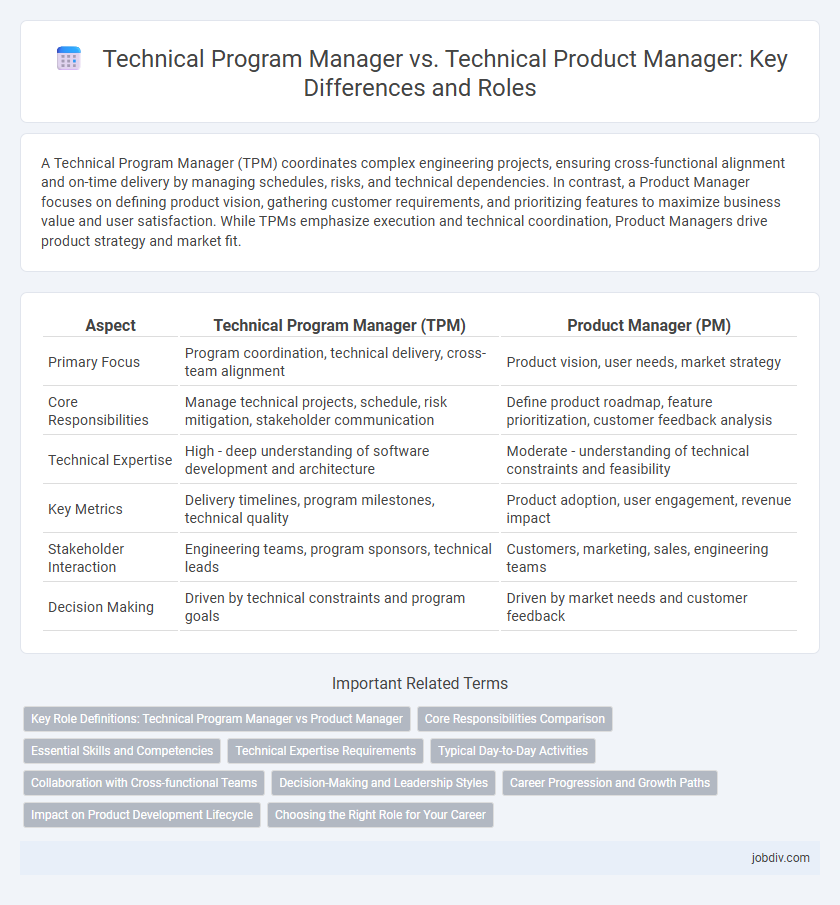A Technical Program Manager (TPM) coordinates complex engineering projects, ensuring cross-functional alignment and on-time delivery by managing schedules, risks, and technical dependencies. In contrast, a Product Manager focuses on defining product vision, gathering customer requirements, and prioritizing features to maximize business value and user satisfaction. While TPMs emphasize execution and technical coordination, Product Managers drive product strategy and market fit.
Table of Comparison
| Aspect | Technical Program Manager (TPM) | Product Manager (PM) |
|---|---|---|
| Primary Focus | Program coordination, technical delivery, cross-team alignment | Product vision, user needs, market strategy |
| Core Responsibilities | Manage technical projects, schedule, risk mitigation, stakeholder communication | Define product roadmap, feature prioritization, customer feedback analysis |
| Technical Expertise | High - deep understanding of software development and architecture | Moderate - understanding of technical constraints and feasibility |
| Key Metrics | Delivery timelines, program milestones, technical quality | Product adoption, user engagement, revenue impact |
| Stakeholder Interaction | Engineering teams, program sponsors, technical leads | Customers, marketing, sales, engineering teams |
| Decision Making | Driven by technical constraints and program goals | Driven by market needs and customer feedback |
Key Role Definitions: Technical Program Manager vs Product Manager
A Technical Program Manager (TPM) focuses on coordinating complex technical projects, ensuring cross-functional teams deliver on time while managing dependencies and mitigating risks. In contrast, a Product Manager (PM) defines the product vision, prioritizes features based on market research and customer needs, and aligns stakeholders around product strategy. TPMs emphasize execution and technical delivery, whereas PMs drive product direction and customer-centric innovation.
Core Responsibilities Comparison
Technical Program Managers primarily coordinate cross-functional teams to ensure timely delivery of complex technical projects by managing schedules, risks, and dependencies. Product Managers define product vision and strategy, prioritize features based on market research and customer needs, and drive product lifecycle from ideation to launch. The core responsibility of TPMs centers on execution and technical alignment, while PMs focus on market fit and stakeholder value creation.
Essential Skills and Competencies
Technical Program Managers excel in cross-functional project coordination, risk management, and technical expertise to deliver complex solutions on time, emphasizing strong communication and stakeholder alignment skills. Product Managers focus on market research, customer needs analysis, and product roadmap development, requiring strategic thinking, user experience insight, and prioritization skills to drive product success. Both roles demand leadership and collaboration abilities but differ in their core competencies: TPMs prioritize technical execution while PMs emphasize product vision and market fit.
Technical Expertise Requirements
Technical Program Managers require deep expertise in software development processes, system architecture, and integration challenges to effectively coordinate cross-functional teams and manage project timelines. Product Managers prioritize market research, user experience, and Go-To-Market strategies, needing less detailed technical knowledge but strong understanding of technology trends to align product vision with customer needs. Technical proficiency in coding languages, cloud infrastructure, and DevOps tools differentiates Technical Program Managers from Product Managers who focus more on strategic product roadmaps and stakeholder communication.
Typical Day-to-Day Activities
Technical Program Managers coordinate cross-functional teams, manage project timelines, and track technical deliverables to ensure successful program execution. Product Managers focus on defining product vision, gathering customer requirements, and prioritizing features to align with business goals. Both roles collaborate closely but differ in scope, with TPMs emphasizing execution and risk management while PMs drive product strategy and market fit.
Collaboration with Cross-functional Teams
Technical Program Managers drive coordination among engineering, design, and operations teams to ensure seamless project execution and timely delivery. Product Managers define product vision and prioritize features by collaborating closely with marketing, sales, and customer support to align product development with market needs. Both roles require strong communication skills and the ability to synchronize cross-functional efforts to achieve business goals effectively.
Decision-Making and Leadership Styles
Technical Program Managers excel in cross-functional decision-making by coordinating technical teams and aligning project timelines with engineering capabilities, emphasizing process optimization and risk mitigation. Product Managers prioritize customer-centric leadership, leveraging market insights and user feedback to make strategic product decisions that drive business outcomes and feature prioritization. Both roles require adaptive leadership, but TPMs focus on execution efficiency while PMs lead through vision and market-driven innovation.
Career Progression and Growth Paths
Technical Program Managers (TPMs) typically advance by deepening expertise in project management, cross-functional collaboration, and technical execution, often moving into senior TPM or director-level roles overseeing multiple complex programs. Product Managers (PMs) progress by expanding ownership of product strategy, market analysis, and customer experience, with potential growth into senior product leadership positions such as Group Product Manager or VP of Product. Career paths for TPMs focus on operational efficiency and delivery execution, while PMs emphasize strategic vision and market-driven decision-making.
Impact on Product Development Lifecycle
Technical Program Managers streamline cross-functional collaboration, ensuring timely delivery of technical milestones within the product development lifecycle. Product Managers drive the vision and strategy, prioritizing features based on market needs and customer feedback to shape product direction. Their combined impact balances technical execution with market-driven innovation, optimizing the overall development process.
Choosing the Right Role for Your Career
Technical Program Managers excel in coordinating complex projects across engineering teams, emphasizing execution and technical alignment, while Product Managers focus on defining product vision, customer needs, and market strategy. Choosing the right role depends on whether you prefer managing cross-functional delivery timelines or driving product innovation and business outcomes. Assess your strengths in technical leadership versus strategic customer-centric decision-making to align with career growth in either program management or product ownership.
Technical Program Manager vs Product Manager Infographic

 jobdiv.com
jobdiv.com